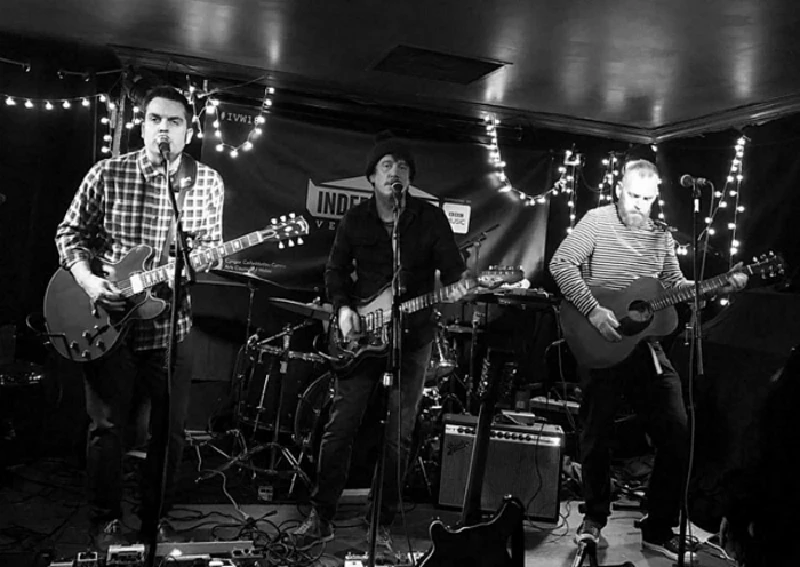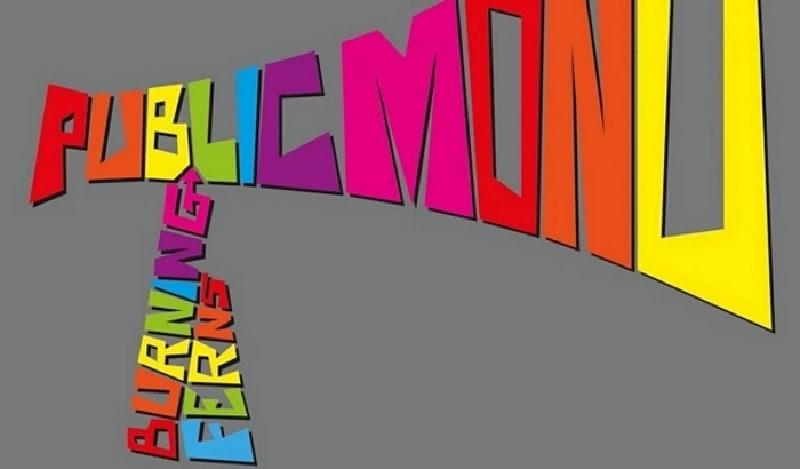Burning Ferns - Interview
by Kimberly Bright
published: 29 / 6 / 2018

intro
Anthony Gray of rising Welsh stars Burning Ferns talks to Kimberly Bright about the band's influences and songwriting ethic and about the Newport scene.
Burning Ferns - from the Welsh town of Newport - are a fabulous '60s-tinged power-pop band fronted by main songwriter, guitarist, and vocalist Tony Gray, a true craftsman with an amazing gift for creating not only irresistible hooks but gorgeous vocal harmonies. Think Big Star, the Byrds, and Teenage Fanclub. He and guitarist Nathan Abraham, bass and keyboard player Brychan Todd, drummer Slim Short, and rhythm guitarist and vocalist David Corten are mature enough to have day jobs and families, a firm grasp of music history, and a distinct memory of what life was like before MP3s and the intrusiveness of the internet. 'Public Mono' is the strong follow-up to the Ferns' acclaimed debut 'See Saw Sew' and is one of the best albums of the year, even with incredible competition from other Welsh acts such as Armstrong and Boy Azooga. They did an incredible acoustic set on Janice Long's BBC Radio Wales show in April and will be appearing at the Please Mind Your Head VIII fundraiser at Clwb Ifor Bach in Cardiff on 8 July. Prior to a busy summer Tony was kind enough to talk to Pennyblackmusic about the inspiration for some of their new songs, pop songwriting rules, the Ferns' new recruit David, and their producer Richard Jackson. PB: You mentioned "The Letter" being an inspiration for 'Bullet Train'. Were there any other classic train songs you were aspiring to when writing it? Tony Gray: Not other train songs really, but I do love The Monkees' 'Last Train to Clarksville' and The Kinks' 'Last of the Steam Powered Trains'. But the train thing here kind of happened from the riff, then the vignette-style lyrics were inspired mainly by The Box Tops' 'The Letter'. The riff happened on a twelve-string, and the octave pattern of the first two notes felt like I was playing on train tracks. The rest of the riff became sort of chug-a-lug, train-track rhythmic as a result, I think. Then the lyrics happened as a result of that. There's something about trains. I think it's because they can only go in one direction and when they've started moving you can't get off. Then they rhythmically move you to your destination, and all you've got is the changing landscape and your commitment to that destination. It's a very dramatic way to leave a relationship. The character leaving in "Bullet Train" knows this and exploits it. The rejected character can't accept it and races the train to the next stop in their car. They make the train, but things don't go to plan. The tables are turned and they're literally going somewhere they really don't want to go, physically and mentally, and it's raining... PB: How did you meet David? TG: I first met David years ago in a pub called The Griffin in Newport which was run by a friend Lee Thompson and his dad. Dave was a barman there. I knew he was in various bands. We didn't talk much beyond saying saying "alright" to each other. Then he worked in a local guitar shop for a bit and it was pretty much the same. I think once the conversation went as far as "how's it going?" after the "alright" which possibly culminated in: "Yeah, not bad, you?". This meant we weren't total strangers when David got the call to join the Ferns. David knew Nathan (Abraham) better than me I think because of Nathan's Newport musical history. He's a local hero and I know David regarded him as such. PB: You've talked about how bringing David into the band helped to broaden the vocals and you do obviously put a tremendous amount of work into the harmonies, even though you make it seem easy. Do you feel like the Welsh choral tradition influenced any of you growing up? Were any of you involved in any men's choirs or other types of choral groups growing up outside of pop music? TG: Well, we were both in the St Woolos Cathedral boys' choir. I was in it for about six months when I was ten. I think I got kicked out for being naughty so I never made it past the blue cassock stage. David, however, made it to deputy head chorister, which meant he got to wear a burgundy cassock with a surplice and ruff. Aside from that no men's choirs, at least for me. The Ferns is the first bit of 'proper' singing I've done since then. I never really regarded myself as a singer until the songwriting kicked in, then you have to embrace it. I'm far more comfortable with it now than I was at the beginning. Nathan was Paul McCartney in the Bandit Beatles and did backing vocals in most of his other outfits. When we started out he was far more versed in the art of vocal delivery than I was, so I took his lead. PB: What are the specific pop "rules" or constraints you embrace when writing songs? TG: If it's a pop tune try to keep it under three minutes 40 seconds. Where that's not happening, make sure there's enough variance to prevent dull repetition. Try to make earworms with hooks. Make sure the chorus sounds like a chorus and make sure the middle eight is as much of a deviation from the rest of it as you can reasonably get away with. Try to make the chord progression non-obvious. Make sure the vocal melody isn't too burdensome and the words can be sung as a melody that makes sense - I think that's called 'scansion'. Make sure the lyrics are thought-provoking and their delivery isn't a deviation from the feel of the main tune. PB: What is your pet peeve of music that wildly strays from any useful limits? TG: A lack of something to latch on to is really frustrating. I can't handle free form jazz for instance, but I can handle jazz with hooks. I think it's just hooks. I think King Gizzard and the Lizard Wizard break the mould nicely with hooks that go beyond pop constraints. They'll play what feels like free form then glue it altogether again with a hook you can sing along to, so it can be done, but they're not necessarily 'songs' as much as they're 'pieces of music'. When you're doing songs with verses and choruses then unless you're Leonard Cohen it just seems to make sense to hold things together with hooks and deliver a short, hopefully meaningful message in a few verses with a chorus that hits the point home. PB: Do you consider Richard Jackson to be The Sixth Fern? How does he get you in a way that others don't? TG: Richard is the sixth Fern for sure. He's able to nail our references and relate them to what we're doing but also add some great ideas of his own. My favourite of his is the slap back echo on the drums that kicks in at the end of '0's & 1's'. That really opened up the outro into something different. He's a local guy who's been on the scene for ages, so we all automatically get each other. There's no political crap getting in the way of things, and he's always honest. He's also a completely masterful engineer who's regularly employed by Welsh legends such as Gruff Rhys and Cate Le Bon. PB: What guitars, pedals, and basses do you tour with? TG: For me at the moment it's either a Gretsch 6122 Chet Atkins, an Italia Modena Challenge, or a Thinline Telecaster which I put together myself. I also use an Italia Rimini 12 string. I love both the Italia guitars. The Gretsch is beautiful, but the Italia Modena might be making the Gretsch a studio guitar as it's so versatile live as well as being amazing to play. Pedals-wise I've got a Rockwell Atomic booster which is always on, a Lumpy's Lemon Drop, a Boss OD-3, an MXR compressor, and a Digitech TR-7. All this goes through a Fender Silverface Deluxe Reverb Amp. For Nathan it's a Gibson ES335 through a Mesa Boogie Mark V. His pedal board is quite large and as a result is nicknamed 'The Continent of Africa'. Mine's called 'Luxembourg'. He's a total guitar nerd and has all sorts on his board, mostly boutique stuff - a wah-wah, compressor and overdrive feature heavily as does the Boogie's amp controller board, which in itself is at least 12 buttons. It's like the flight deck of the Millennium Falcon. He's also got an Eventide H9 Harmoniser. I'm not sure what he uses it for, but it appears to be able to do anything, including making the tea. Dave plays a Sigma S-00015m acoustic through a Fender Blues Junior FSR Silver. Brych plays an amazing Tokai Rockinbetter through a Fender Rumble 500 and a compressor. This is handed over on occasion to David who takes up bass duties while Brych plays keyboard. Slim plays mixed bits of kit from Zildjan to Sonor, Ludwig and DW and always Remo drum heads. PB: Do you have song ideas and lyrics on scraps of paper and napkins lying around your houses and cars or do you have tidy file systems? TG: It's mainly in notes on my phone now. Some scraps of paper, but you can't lose digital notes so that's taking over. Also music memos on the phone for capturing guitar/ vocal ideas. It's really convenient and also can't be lost if you save to the cloud. This part of digital tech I like. PB: What inspired you to add vibes to "Made of the Sun"? Were you going for a Brian Wilson feeling on that one? TG: That's how it ended up sounding. I think the vibes made it into that. They happened just from experimenting with keyboard sounds and trying find something that fit. For the lazy sun-quenched feel of the song I think they were a natural choice, but that must come from influences that were already established, Brian Wilson being one of those massive influences! PB: Thank you.
Band Links:-
http://www.countrymile.orghttp://www.facebook.com/burningferns/
http://www.twitter.com/burningferns
Picture Gallery:-

soundcloud
reviews |
|
Public Mono (2018) |

|
| Second album from Burning Ferns proves to be precisely what 60's pop fans have needed for a very long time. |
| Bullet Train/Fuses Blow (2017) |
most viewed articles
current edition
Carl Ewens - David Bowie 1964 to 1982 On Track: Every Album, Every SongArmory Show - Interview with Richard Jobson
John McKay - Interview
Colin Blunstone - Thalia Hall, Chicago, 16/7/2025
Bathers - Photoscapes 1
Loft - Interview
Billie Eilish - O2 Arena, London, 10/7/2025
Visor Fest - Valencia, Spain, 26/9/2025...27/9/2025
Sir Tim Rice - Interview
Robert Forster - Interview
previous editions
Heavenly - P.U.N.K. Girl EPManic Street Preachers - (Gig of a Lifetime) Millennium Stadium, Cardiff, December 1999
Peter Perrett - In Dreams Begin Responsibilities Interview Part One
Beautiful South - Ten Songs That Made Me Love...
Boomtown Rats - Ten Songs That Made Me Love....
Coldplay - Wembley Arena. London, 16/8/2022
Oasis - Oasis, Earl's Court, London, 1995
Prolapse - Interview
Trudie Myerscough-Harris - Interview
Pixies - Ten Songs That Made Me Love...
most viewed reviews
current edition
Davey Woodward - Mumbo in the JumboSuzanne Vega - Flying With Angels
Nigel Stonier - Wolf Notes
Vinny Peculiar - Things Too Long Left Unsaid
Lapsley - I'm a Hurricane, I'm a Woman In Love
Philip Jeays - Victoria
Taylor Austin Dye - Sick of Me
Billy Nomates - Metalhorse
Morcheeba - Escape The Chaos
HAIM - I Quit
Pennyblackmusic Regular Contributors
Adrian Janes
Amanda J. Window
Andrew Twambley
Anthony Dhanendran
Benjamin Howarth
Cila Warncke
Daniel Cressey
Darren Aston
Dastardly
Dave Goodwin
Denzil Watson
Dominic B. Simpson
Eoghan Lyng
Fiona Hutchings
Harry Sherriff
Helen Tipping
Jamie Rowland
John Clarkson
Julie Cruickshank
Kimberly Bright
Lisa Torem
Maarten Schiethart